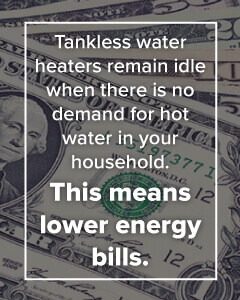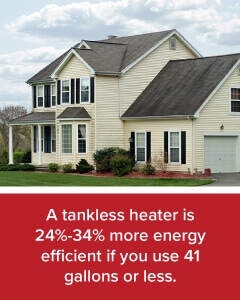For most homeowners, the water heater is an appliance that they rarely see and hope that they never have to replace. But that notion is just not realistic. Like all appliances, hot water heaters are subject to fatigue, corrosion and will eventually need to be replaced. If you have a tank-type water heater, the time to consider replacement is before the warranty period expires, but regardless of how old it is, you should check it regularly for rust, water stains (from water running down the unit) and seepage. Anyone who’s ever had a water-heater breach knows how the collateral costs can add up. In addition to the expense of repairing or replacing the unit itself, mold, mildew and damage to your floors and walls can run into thousands of dollars. Keep reading to learn when to replace your water heater, the differences in hot water heaters, the pros and cons of tankless hot water heaters, the cost of switching to a tankless hot water heater, and advice on converting to a tankless heater.
When Should I Replace My Water Heater?
Unfortunately, predicting the life of a water heater is not an exact science. Both tank-type and tankless water heaters often last beyond their warranties. There are so many factors involved in the decay of tank-type water heaters — the corrosiveness of the water supply, whether it’s an indoor or outdoor unit, the amount of hot water running through it, et cetera — the only reliable way to know when you need to replace one is by periodic inspection. On the other hand, some homeowners replace their tank-type water heaters to take advantage of the long-term savings and increased efficiencies of tankless water heating systems. Tankless water heaters offer a number of advantages to homeowners, which is why they’re growing in popularity. But there are some compromises, as well. Because hot water heater replacement represents a significant expenditure in both time and money, you need to do your research.
What Are the Differences Between Tankless and Tank-Type Water Heaters?
The design of tankless water heaters is a radical departure from the traditional hot water heaters that rely on the glass-lined steel vessels. To determine whether or not you should go tankless, it might help to understand how the two types of water heaters work.
more information on tankless vs traditional water heaters
How Do Tank-Type Water Heaters Work?
Traditional water heaters are by far the more common types of water heaters. Tank-type units can generate heat with electricity or fuel, like natural gas or heating oil. Water travels into the unit’s tank via a water supply pipe. It sits in the tank until the heating element raises it to a specified temperature. Most of the time, you don’t use your water immediately, so the hot water just sits in the tank.
Insulation helps keep the heat from seeping away while the water is waiting for use. If the water temperature drops, the thermostat signals the unit to begin heating it again, until it reaches the desired temperature. When you open up the hot water on a faucet inside of your house, it draws from the tank via the hot-water delivery pipe. As you continue to draw hot water from the tank, it’s replaced by cooler water coming in through the water supply pipe. If you use hot water faster than your unit can heat it, the average water temperature drops.
The “recover rate” refers to the rate at which your tank-type water heater can heat water, usually measured in gallons per hour. For instance, a heater might be able to raise the temperature of 70 gallons of water to 120 degrees in an hour. The higher the recovery rate, the less likely that you’ll run out of hot water. The larger the tank is, the longer it will take to deplete the existing hot-water reserve, so a larger tank can accommodate a larger number of simultaneous uses for a longer period.
To fight corrosion, many tanks have a glass wall inner lining. If a crack forms in that glass, it’s usually only a matter of time before moisture compromises your tank’s lining. All modern hot water tanks are equipped with a temperature and pressure release valve (T&P valve), which will open and release some water if either the temperature or pressure exceed safety parameters. This shouldn’t happen, though, if all heating unit components are working properly.
Tankless Water Heaters (Demand-Type Water Heaters)
Like tank-type hot water heaters, tankless systems have a water supply pipe and a hot-water delivery pipe, but that’s where the similarity ends. Tankless water heaters rapidly heat water as it flows through the system, so there is no water storage, but usage can exceed the hot water output. Overall, this is an advantage, since water doesn’t have to reheat when the system is idle. Tankless water heaters use either gas flame or electric heating coils to “super heat” the water as it passes. In most cases, the water comes out far too hot for immediate usage, so it’s mixed with cooler water before it reaches the faucets, to come out an appropriate temperature. Tankless water heaters don’t require a T&P valve because there is no tank in which to build pressure.
Now that you understand the differences between tank-type and tankless heaters, you probably recognize some of the benefits of tankless water heaters, but before you run out and buy a tankless unit, there are some additional benefits and a few drawbacks that you’ll need to consider.
Tankless Water Heater Pros and Cons
 Pros
Pros
- Lower Energy Bills — Tankless water heaters remain idle when there is no demand for hot water in your household. They only switch on when someone turns on a hot water faucet or when an appliance, like your clothes washer or dishwasher, requires heated water. Compare that to a tank-type water heater, which has to reheat water anytime it cools. According to the S. Department of Energy, “For homes that use 41 gallons or less of hot water daily, demand water heaters can be 24%–34% more energy-efficient than conventional storage-tank water heaters.” Lower energy consumption means lower electric bills.
- Endless Supply of Hot Water — Because tankless water heaters don’t operate by storing and heating water, they never run out of hot water. Tankless systems can produce anywhere from 2-7 gallons of water per minute, so it is possible to exceed their production capabilities by drawing it from too many sources. If you size your unit appropriately, however, you should never run out of hot water.
- Tankless Water Heaters Last Longer — On average, tankless water heaters last longer than tank-type heaters. Most tank-type water heaters have a life span of 10-15 years. The average life expectancy of a tankless heater is more than 20 years. Therefore, there are substantial long-term savings with a tankless unit. Because tankless water heaters last longer, the warranties are generally longer than those covering tank-type units.
- Smaller Size — You only have to compare a 50-gallon tank-type water heater to a tankless water heater to notice that the size difference is substantial. A 50-gallon tank water heater might have dimensions in the neighborhood of 5’ in height and 2’ diameter. In a closet, that would occupy most of the available space. A tankless water heater might follow dimensions along the lines of 24”x12”x6” and can mount on a wall or in the back of a closet or cabinet, allowing plenty of space for other storage.
- Federal Tax Credit — There’s currently a $300 tax credit available for non-solar tankless water heaters that meet the federal requirements. It’s important to note that this isn’t the same as a $300 rebate you receive at the time of purchase. These savings are realized at the time you file your income taxes. Your installer should be able to tell you about the availability of local and state incentives.
No Rust or Corrosion — Tank-type water heaters are constantly filled with water, which often comes in contact with their metal surfaces. Water runs through a tankless water heater, but doesn’t sit in them. This reduces the likelihood of water damage to the unit.
- Versatility — In addition to being small enough to store in a number of places around the home, tankless water heaters often have multiple settings and can be operated via remote control.
- Increased Home Value — Because there are so many advantages to tankless water heaters, having one can increase the appeal of your home at resale. Realtors are quick to point out modern, “green” appliances when they’re showing houses to prospective buyers and to mention the lower monthly power bills that come with tankless systems.
Cons
- Initial Cost — While tankless water heaters can provide substantial savings over time, the initial cost outlay can be prohibitive. The purchase price of tankless heaters can be two or three times as much as a tank-type heater. Because you can expect a reduction in your monthly energy bills, you should determine the amount of time it will take you to break even on your upgrade by dividing the price difference between the two types of heater that you’re considering and dividing that difference by the average monthly savings. For example, if the price difference is $700 and you save $20 per month, it will take 35 months to recoup your expenses. This doesn’t include the $300 tax credit that you may be eligible for. If you intend to move from the property soon, it may not benefit you to save money on your heating bills.
- Shared Hot Water Output — If you try to save money and purchase a smaller unit, you may not be able to comfortably shower or shave while you’re running your dishwasher. That’s because the system shares hot water among whichever faucets or appliances are demanding it. A larger unit may be able to handle several simultaneous draws, but the initial expense for those units is higher.
- Additional Costs — You may need to run lines to and from your tankless water heater — particularly if you’re moving your system to a different location in your house. Installation may be more expensive than if you are replacing a tank-type system with an identical model.
- Installation — Whether you’re replacing a tankless system or upgrading from a tank-type water heater, you should leave the water heater installation to a professional who’s certified to install tankless heaters. If you’re replacing a tank-type heater, you may want to make sure that they don’t charge extra for the disposal of the old unit.
Should I Get a Tankless Hot Water Heater?
While the pros of a tankless water heating system make a strong argument for upgrading to one, some people still opt for less expensive tank-type units. This is usually because they’re uncertain that they’ll own the property for long enough to recoup their initial expenditure or they may not be able to afford a pricier unit at the time that they need to replace the old one.
As previously mentioned, if you plan to sell your residence in the short term, you may not own the tankless water heater long enough to realize long-term savings. Your tankless system may add some value to the property, but it’s difficult to know by exactly how much. On average, if you intend to stay in your home for at least ten years or more, you’ll not only break even in most cases, but you’ll continue to save money over the life of the tankless water heater. Since tankless water heaters usually outlast tank systems, you may get an extra five or more years of life from your water heater than if you opted for a tank-type.
And while tankless water heaters are initially more expensive, there is the $300 federal tax credit, which does provide a little relief in the first year. Most tankless water heater installers provide financing options that can assist when money is tight. You can even partially offset the monthly payments by the power bill savings.
central pa tankless water heater services
How Much Will My Savings Be with a Tankless Water Heating System?
There are a number of factors that affect how much you’ll save from converting to a tankless water heater and how soon you’ll break even on the unit:
- The amount of hot water you use
- The number of people in your home
- The size of the unit you choose
- The cost of the tankless unit
- The price difference between the tankless unit and a comparable tank-type unit
According to the U.S. Department of Energy, a tankless heater is 24%-34% more energy efficient if you use 41 gallons or less. A tankless heater is 8%-14% more energy efficient if you use 86 gallons of hot water.
According to the Department of Energy, “ENERGY STAR® estimates that a typical family can save $100 or more per year with an ENERGY STAR qualified tankless water heater.”
Aside from the cost savings, if you select the right size unit for your home, you’ll realize a tankless hot water heater is a luxury that as soon as you notice that you haven’t run out of hot water in a while. Deciding between a gas, electric or tankless water heater is hard but Home Climates is here to help you make the right choice.
Consult a Professional to Convert to a Tankless Water Heater
As tankless water heater installers in Central PA, we recommend that you do your own research before considering any major home appliance purchase. Before you make a final decision on whether or not to go tankless, contact an experienced professional with any questions that you have. If you’re in Central Pennsylvania, contact Home Climates for a home estimate.










 Pros
Pros No Rust or Corrosion — Tank-type water heaters are constantly filled with water, which often comes in contact with their metal surfaces. Water runs through a tankless water heater, but doesn’t sit in them. This reduces the likelihood of water damage to the unit.
No Rust or Corrosion — Tank-type water heaters are constantly filled with water, which often comes in contact with their metal surfaces. Water runs through a tankless water heater, but doesn’t sit in them. This reduces the likelihood of water damage to the unit.
